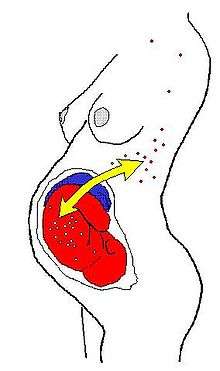
Microchimerism
Microchimerism (abbreviated Mc) is the presence of a small number of cells that originate from another individual and are therefore genetically distinct from the cells of the host individual. This phenomenon may be related to certain types of autoimmune diseases; however, the mechanisms responsible for this relationship are unclear.
Types of microchimerism
Human
In humans (and perhaps in all Placentals) the most common form is fetomaternal microchimerism (also known as fetal cell microchimerism or fetal chimerism) whereby cells from a fetus pass through the placenta and establish cell lineages within the mother. Fetal cells have been documented to persist and multiply in the mother for several decades. The exact phenotype of these cells is unknown, although several different cell types have been identified, such as various immune lineages, mesenchymal stem cells, and placental-derived cells. A 2012 study at the Fred Hutchinson Cancer Research Center, Seattle, has detected cells with the Y chromosome in multiple areas of the brains of deceased women.
Podcasts:

